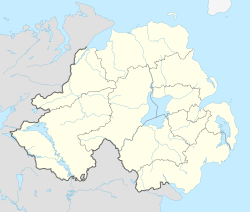Bombing
At around 4:25 pm on Tuesday 2 November, three IRA members entered the Red Lion pub, beside Ballynafeigh RUC station on the Ormeau Road in Belfast. Two of them planted a bomb while the other guarded them with a gun. Before leaving the pub, one of the IRA men shouted "you have ten seconds to get out". [4] Some customers ran out the front door, but others who tried to leave by the side door found it had been locked for security reasons. [4] The bomb exploded only about six seconds after the warning. [4] The walls collapsed and the roof fell in; around thirty people were injured and many of them were buried under rubble. [4] Three Protestant civilians were killed: John Cochrane (67), Mary Gemmell (55), and William Jordan (31), who died two days later. [5]
At the same time, another bomb exploded in a shop on the other side of the RUC station. The Belfast Telegraph reported: "There is no doubt in the minds of police that the police station was the target [...] both bombs were placed against the inner walls of the pub and the shop in an attempt to bring down the station on top of the RUC men inside". [4] An RUC spokesman added: "even if they did miscalculate the fuse of the bomb, ten seconds was certainly not nearly enough to allow everyone to get out". [4]
This page is based on this
Wikipedia article Text is available under the
CC BY-SA 4.0 license; additional terms may apply.
Images, videos and audio are available under their respective licenses.
